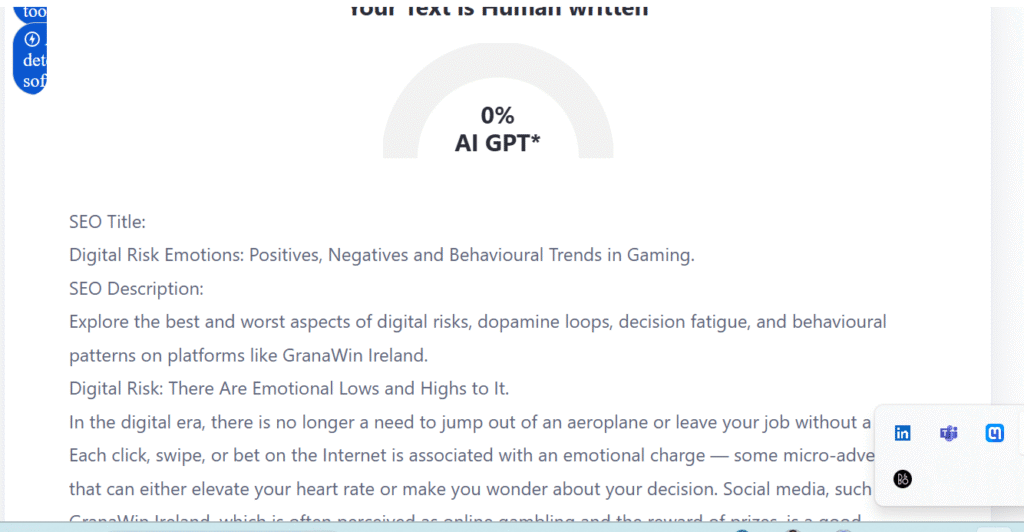Digital Risk: There Are Emotional Lows and Highs to It

In the digital era, there is no longer a need to jump out of an aeroplane or leave your job without a cause. Each click, swipe, or bet on the Internet is associated with an emotional charge — some micro-adventure that can either elevate your heart rate or make you wonder about your decision. Social media, such as GranaWin Ireland, which is often perceived as online gambling and the reward of prizes, is a good example of how online communities heighten excitement and nervousness. However, the excitement of digital risk is more than just gambling; it is a glimpse into the behaviour of humans, neuroscience, and reward psychology.
Risk-Taking in E-Psychology.
It is not a rational circuit that this dopamine loop follows; it is a circuit that makes one feel alive. Many behavioural economists cite phenomena such as decision fatigue and cognitive bias, which influence our decision-making when the stakes are perceived to be in an intangible but immediate form. Even a mere alert, a flashy reward or a close call can draw us into the same patterns of action when we are supposed to step back. They are not mere abstract theories, but the unseen forces behind the hundreds of millions of digital interactions daily.
The Emotional Rollercoaster of Internet Interaction.
There is a set of emotions that come before and after taking a digital risk: high expectations and victory, low expectations and disappointment, frustration and anger. Take the case of a player taking advantage of best blackjack bonus promotions. The first ecstasy of a possible victory releases adrenaline. Confidence is increased by success, leading to a short-term feeling of mastery.
However, where results are less than satisfactory, disappointment prevails, and in many cases, in a disproportionate manner to the actual loss. The psychologists refer to this as the near-miss effect: a psychological surge of emotions increases when you are near a reward, leading to repeat behaviour. These ups and downs over time create familiar behavioural patterns that influence the way people interact with digital environments.
Neuroscience: A Dark Web Gamble.
In all decisions involving uncertainty, the prefrontal cortex, the seat of rational thinking, clashes with the engine of the emotional system, the limbic system. This is the collision which is spurred by digital platforms. The love of immediacy in our brain is leveraged through instant feedback, fast variable rewards, and visually stimulating interfaces. That is why making only one spin in a game such as GranaWin Ireland can be more emotionally striking than a decision taken slowly and meticulously in real life.
The neural circuits are reinforced by repetitive stimuli, forming a behavioural loop wherein positive (emotional highs) stimuli promote repetitive behaviour, and negative (stress, regret, disappointment) stimuli promote reflection, even increased introspection. Our brains, in other words, get used to the fact that unpredictability needs to be craved.
The Digital Environments are the Emotional Laboratories.
The technology of the online space has transformed daily digital interaction into a microcosm of danger and compensation. Variable rewards make users anxious in gaming and gambling-proximate environments, whereas instant gratification systems serve a short-term attention span. This is reflected in social media platforms, where likes, shares, and viral material provide mini dopamine releases, with every choice being emotionally charged.
Emotional investment more often than not follows the same patterns as gambling, even when no money is at stake. Behavioural economics interprets such tendencies as a form of risk-reward asymmetry: we overestimate the possible gains and underestimate the possible losses. Digital spaces are capitalising on this instinctively, providing the excitement of randomness while offering the reassurance of regulation.
Expert’s Advice: How to Avoid the Emotional Roller Coaster.
Awareness is the most important point that behavioural scientists emphasize for learning how to take risks online. By understanding dopamine loops, variable reward systems, and instant gratification triggers, one can participate in activities without becoming victims of compulsive cycles. Professionals emphasize the need for systematic boundaries and conscious engagement with platforms, as well. Speaking of the industry, brands like GranaWin Ireland are in a delicate position: they offer enjoyable experiences and indirectly influence behavioural patterns.

